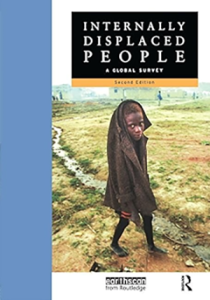Internally Displaced People: A Global Survey

Editor: Janie Hampton
Publisher: Routledge
Year of Publication: 2002
Print Length: 256 pages
Genre: Non-Fiction / Political Science, Migration & Refugee Studies
Area: Africa, North Africa, Algeria, Angola, Burundi, Democratic Republic of Congo (DRC), Eritrea, Ethiopia, Guinea, Guinea-Bissau, Kenya, Liberia, Nigeria, Republic of the Congo (Brazzaville), Rwanda, Senegal, Sierra Leone, Somalia, Sudan, Uganda, Asia, Asia-Pacific, Middle East, Europe, Afghanistan, Bangladesh, Burma/Myanmar, India, Indonesia, Pakistan, The Philippines, Solomon Islands, Sri Lanka, Uzbekistan, Armenia, Azerbaijan, Bosnia and Herzegovina, Croatia, Cyprus, Yugoslavia, North Macedonia, Georgia, Moldova, Russia, Turkiye, Iraq, Israel, Lebanon, Palestine, Syria, South/Latin America, Colombia, Guatemala, Mexico, Peru
Topic: Internally Displaced Person (IDP), Refugees & Forced Migration, Statistics, Challenges & Opportunities, Development, Humanitarian Action & Humanitarianism, Non-Profit Organization (NGO), International Institutions, United Nations, Training & Workshop
The number of internally displaced people far outnumbers estimated refugees who have fled their countries. The majority of displaced populations survive with very little security or legal protection. Responding to the needs of internally displaced people is one of the greatest humanitarian challenges of our time. Revised and updated from the first edition, this volume includes information on internal displacement in 47 different countries across the globe – that is to say all countries experiencing conflict-induced displacement at the time of publication. There is discussion of the causes of displacement, patterns of flight, protection concerns and international response.
Table of Contents
Editorial team
Main contributing authors
Acknowledgements
Acronyms and abbreviations
Foreword by Dr Francis M Deng
List of maps
List of figures, tables and boxes
List of photos
PART 1: ISSUES AND PERSPECTIVES
1. Introduction
The problem of internal displacement / The Global Survey
2. The Global IDP Database: challenging the information gap
Improving access to available information / Information on internal displacement remains inadequate
3. The Global IDP Project reflects on its training programme
Training national authorities and local NGOs in the use of the UN Guiding Principles / National authorities and NGOs brought together to discuss the UN Guiding Principles / Country-based training programmes can increase sustainability and programme coverage
PART 2: REGIONAL PROFILES
4. Africa
Regional overview / Algeria / Angola / Burundi / Democractic Republic of Congo / Eritrea / Ethiopia / Guinea / Guinea-Bissau / Kenya / Liberia / Nigeria / Republic of Congo (Brazzaville) / Rwanda / Senegal / Sierra Leone / Somalia / Sudan / Uganda
5. The Americas
Regional overview / Colombia / Guatemala / Mexico / Peru
6. Asia and the Pacific
Regional overview / Afghanistan / Bangladesh / Burma/Myanmar / India / Indonesia / Pakistan / The Philippines / Solomon Islands / Sri Lanka / Uzbekistan
7. Europe
Regional overview / Armenia / Azerbaijan / Bosnia and Herzegovina / Croatia / Cyprus / Federal Republic of Yugoslavia / Former Yugoslav Republic of Macedonia / Georgia / Republic of Moldova / Russian Federation / Turkey
8. Middle East
Regional overview / Iraq / Israel / Lebanon / Palestinian Territories / Syria
UN Guiding Principles on Internal Displacement
References
Index

Janie Hampton is the author of fifteen books including social history, biography, fiction and text books. She is an experienced speaker on television and radio, writes articles for newspapers and magazines and gives entertaining talks in theatres, colleges and at literary festivals. She is also an international development and women’s health activist, particularly committed to the empowerment of vulnerable people and communities, especially young women in Africa. In 1991, she developed the British government policy on international reproductive health and her research led to practical strategies which remain government policy. In 2016 she founded the World Menstrual Network to improve menstrual health policies and practice.
Source: https://janiehampton.co.uk/
More from Janie Hampton in this library, click here.
